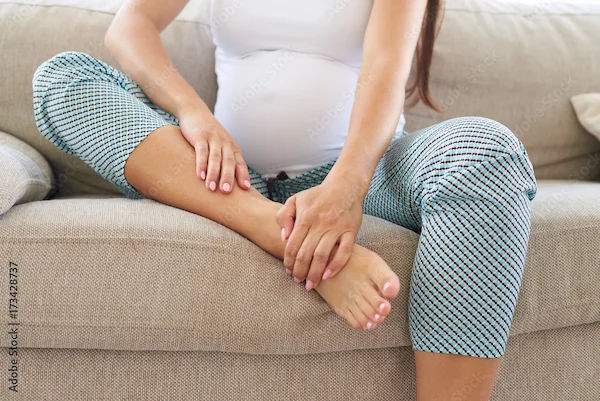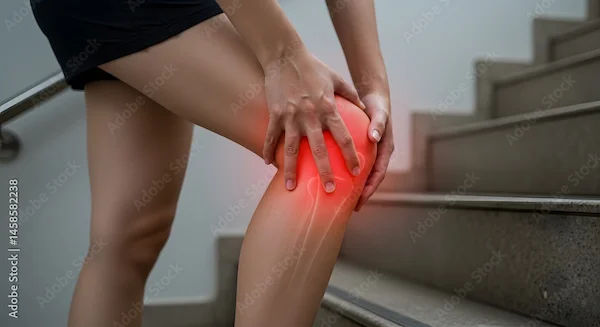How To Reduce Leg Swelling During Pregnancy?
Learn how to reduce leg swelling during pregnancy with effective home remedies, lifestyle changes, and medical precautions. Discover the causes, risk factors, and when to seek medical advice for leg swelling during pregnancy.

Written by Dr. Rohinipriyanka Pondugula
Reviewed by Dr. J T Hema Pratima MBBS, Fellowship in Diabetes Mellitus
Last updated on 13th Jan, 2026

Swelling or oedema of the legs is normal in most pregnant women. This happens due to the increased blood volume in the body and the effect of hormones that lead to fluid retention. As the uterus expands, it presses on veins, slowing circulation in the legs and feet, resulting in swelling that worsens later in pregnancy and hot, humid weather.
This article covers the common causes of leg swelling during pregnancy, risk factors, effective home remedies, dietary and lifestyle modifications and more.
Common Causes of Leg Swelling During Pregnancy
Here are some of the main reasons why leg swelling occurs in pregnancy:
Elevated Blood Volume: Human bodies naturally produce more blood and fluid during pregnancy to accommodate the expanding fetus. This increased fluid volume directly adds to the pregnant woman's retained fluid load.
Hormonal Changes: Pregnancy hormones, including relaxin, which soften the pelvis to help prepare it for delivery, affect tendons and ligaments throughout the body, including those in the feet. This loosening can make the condition flare, causing more swelling and pain.
Uterine Pressure: As the uterus enlarges in response to the growing baby, it may pressure the major veins that carry blood back from the legs toward the heart. This compresses circulation, impeding the efficiency of blood discharge from the lower extremities, which can lead to fluid deposits.
Risk Factors for Developing Leg Swelling in Pregnancy
Specific risk factors that make an individual more susceptible to developing leg swelling during pregnancy are:
Overconsumption of Salt: Eating too much salt (sodium) can result in water retention in the body, swelling and discomfort. Many processed foods, fast foods and condiments are high in sodium.
Prolonged Standing: Remaining in a standing position for long periods strains the veins in the legs and impairs circulation, causing fluid to build up in the lower extremities.
Dehydration: When dehydrated, human bodies retain water to compensate for the perceived lack of hydration. This retention contributes to leg swelling.
Although this has not been definitively confirmed, some evidence indicates that a person may be genetically predisposed to this type of fluid retention. Certain people are born with weaker vein walls or a predisposition to accumulate liquid in their tissues, putting them at greater risk for oedema in pregnancy.
Effective Home Remedies for Reducing Leg Swelling During Pregnancy
Here are a few measures to help decrease swelling in the legs during pregnancy:
Joining the Feet: While sitting, consider joining the feet. This position improves blood circulation and reduces swelling by facilitating fluid drainage from the lower extremities.
Lay on Left Side: When sleeping or resting, try sleeping or laying on the left side since it relieves the pressure on the inferior vena comitans on the right side of the body. This results in increased blood flow, which decreases fluid pooling in the legs.
Reducing Long Duration of Standing: The less time spent standing, the lower will be the pressure on the leg veins, resulting in less fluid pooling in the lower extremities.
Using Compression Stockings: They exert light pressure on the legs, encouraging better blood flow, helping keep the veins and legs healthy, and decreasing swelling.
Steer Clear of Tight Bands: Avoid socks or stockings with tight elastic bands around the ankles.
Consult Top Gynaecologists
Dietary and Lifestyle Modifications for Reducing Leg Swelling
These strategic changes in diet and lifestyle can help minimise leg swelling during pregnancy:
Adequate Water Intake: Maintain adequate hydration levels to ensure that the body does not have to resort to fluid retention.
Avoiding Sugary Drinks: Reducing or eliminating sugary drinks like sodas can prevent dehydration and fluid retention.
Limiting Sodium: Avoiding salty foods like processed snacks, canned foods, and fast food reduces water retention.
Natural Seasonings: Using herbs, spices, and other natural flavour enhancers to season the food instead of salt can help add flavour without increasing sodium levels.
Physical Activities for Managing Leg Swelling During Pregnancy
Including light exercise as part of a daily routine can increase circulation and help control leg swelling. Following are some safe exercises that can be performed during pregnancy:
Walking is a low-impact exercise that encourages flow and decongests the fluid in the legs.
Simple foot exercises, such as flexing and extending the feet, rotating the ankles, and wiggling the toes, can help improve circulation and reduce swelling.
Gentle yoga poses tailored for pregnant women can help enhance circulation, lower stress, and relieve swelling.
Water exercises, such as swimming and water aerobics, reduce swelling by providing buoyancy and support that promotes circulation without compressing the joints.
When to Seek Medical Advice for Leg Swelling During Pregnancy?
Although mild swelling is normal during pregnancy, some symptoms and scenarios require urgent medical care:
Sudden or Severe Swelling: A sudden increase in swelling, especially in the face, hands or feet, can indicate preeclampsia, a dangerous pregnancy complication.
Swelling That Doesn’t Go Down: In case of swelling that continues despite rest and elevation, it could indicate an underlying medical issue.
Symptoms of Potential Complications
Keep a look out for the symptoms of the following conditions when dealing with leg swelling during pregnancy:
Risk Factors for Preeclampsia: Signs of preeclampsia include:
Significant swelling
Hypertension (high blood pressure)
Constant headaches
Visual changes
Upper stomach pain.
Deep Vein Thrombosis (DVT): If one of the legs swells more than the other or if pain, redness, or warmth develops in one leg, this could be DVT. It is a medical emergency that requires urgent evaluation.
Preventive Measures for Leg Swelling During Pregnancy
Here are some effective preventive measures for leg swelling during pregnancy:
Keep An Eye On The Swelling: Monitor how extreme the leg swells and how often it swells, giving the doctor an idea of the patterns.
Choose Attires Wisely: Avoid tight-fitting clothes, especially around the ankles and legs, as they constrict blood flow and increase swelling.
Maintain Healthy Weight: Some swelling can be easily prevented by maintaining a healthy weight range during pregnancy.
Balanced Diet: Consuming a well-rounded diet with all the necessary nutrients supports overall health and prevents fluid retention, which can help keep leg swelling under control.
Conclusion
Managing leg swelling during pregnancy requires a multifaceted approach that includes home remedies, lifestyle changes, and proactive medical care. Although swelling is normal during pregnancy, being aware of it and taking steps to mitigate it can help avoid complications and maintain overall comfort and health.
d67d4978-a14a-46c8-8af8-697823bfcadf
Consult Top Gynaecologists

Dr. Sushma Prasad Sinha
Obstetrician and Gynaecologist
35 Years • MBBS, MD, MRCOG., FRCOG., FICOG, FIMSA
Delhi
Apollo Hospitals Indraprastha, Delhi
(50+ Patients)

Dr. Swetha P
Obstetrician and Gynaecologist
11 Years • MBBS, MS(OBGY)
Hyderabad
Apollo Hospitals Jubilee Hills, Hyderabad
(50+ Patients)

Dr. Vidya Konduri
Obstetrician and Gynaecologist
9 Years • MS
Chinagadila
Apollo Hospitals Health City Unit, Chinagadila
(50+ Patients)

Dr. Antharvedi Santhi
Obstetrician and Gynaecologist
15 Years • MBBS Ms(obstetrics and gynaecology)
Hyderguda
Apollo Hospitals Hyderguda, Hyderguda

Dr. Sowbarnika Ramamoorthy
Obstetrician and Gynaecologist
20 Years • MD.DNB.MNAMS. FMAS, MRCOG (LONDON)
Chennai
Apollo Women Hospitals Thousand Lights, Chennai
(50+ Patients)
Consult Top Gynaecologists For More Remedies

Dr. Sushma Prasad Sinha
Obstetrician and Gynaecologist
35 Years • MBBS, MD, MRCOG., FRCOG., FICOG, FIMSA
Delhi
Apollo Hospitals Indraprastha, Delhi
(50+ Patients)

Dr. Swetha P
Obstetrician and Gynaecologist
11 Years • MBBS, MS(OBGY)
Hyderabad
Apollo Hospitals Jubilee Hills, Hyderabad
(50+ Patients)

Dr. Vidya Konduri
Obstetrician and Gynaecologist
9 Years • MS
Chinagadila
Apollo Hospitals Health City Unit, Chinagadila
(50+ Patients)

Dr. Antharvedi Santhi
Obstetrician and Gynaecologist
15 Years • MBBS Ms(obstetrics and gynaecology)
Hyderguda
Apollo Hospitals Hyderguda, Hyderguda

Dr. Sowbarnika Ramamoorthy
Obstetrician and Gynaecologist
20 Years • MD.DNB.MNAMS. FMAS, MRCOG (LONDON)
Chennai
Apollo Women Hospitals Thousand Lights, Chennai
(50+ Patients)
.webp)



